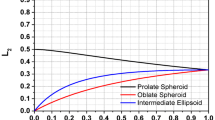Summary
Dielectric loss in heterogeneous model systems is studied between 60 Hz and 40 MHz). The systems consist of water-filled spherical polyethylene shells enclosed in paraffin wax. Experimental results are compared with Wagner's theory, which is extended to account for interactions between neighbouring spheres. Deviations from the theoretical Maxwell-Wagner loss can be explained by two opposing effects; the observed loss appears to exceed the expected value when the spheres are large compared to the distance between the condenser plates, but interaction between adjacent spheres lowers the experimental loss. In some cases the effects, although obviously independent, may even balance leading to apparent agreement between Wagner's original theory and the experiments described here.
Similar content being viewed by others
References
Volger, J., Progress in Semiconductors4 (1960) 205.
Wagner, K. W., Arch. Elektrotech2 (1914) 378.
Van Beek, L. K. H., Physica26 (1960) 66.
Hamon, B. V., Aust. J. Phys.6 (1953) 304.
Sillars, R. W., J. Inst. Elec. Engrs. (London)80 (1937) 378.
Van Beek, L. K. H., Proc. Colloq. Ampère11 (1962) 229.
Böttcher, C. J. F., Theory of electric polarisation, Elsevier Publ. Co., Amsterdam, 1952.
Author information
Authors and Affiliations
Rights and permissions
About this article
Cite this article
van Beek, L.K.H., Booy, J. & Looyenga, H. Dielectric loss in heterogeneous model systems. Appl. Sci. Res. 12, 57–64 (1965). https://doi.org/10.1007/BF00382107
Received:
Issue Date:
DOI: https://doi.org/10.1007/BF00382107




